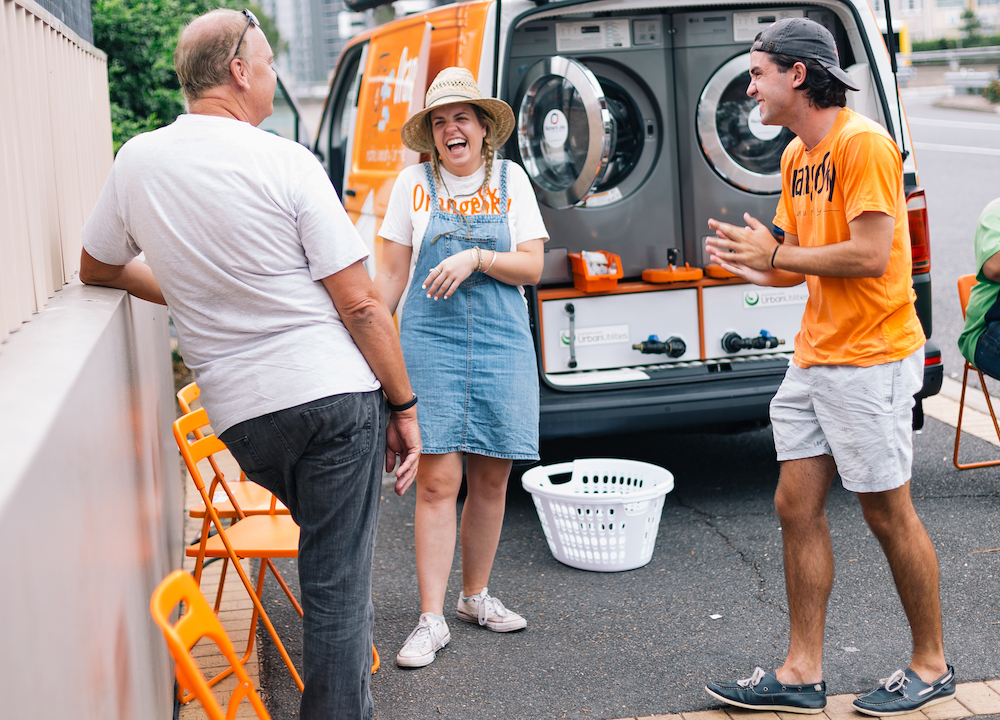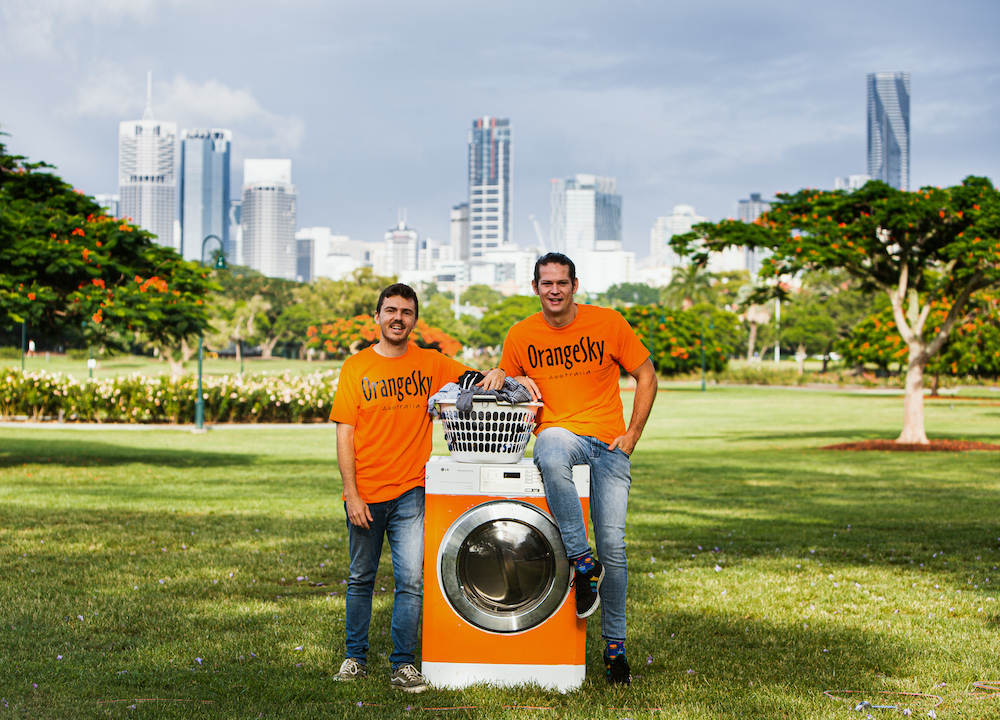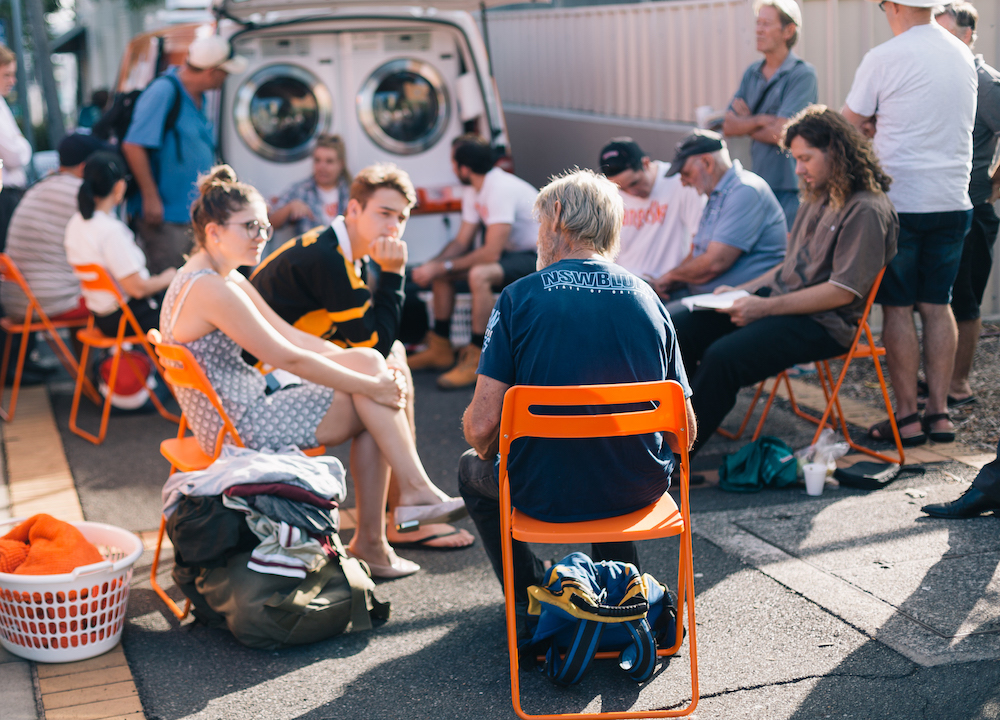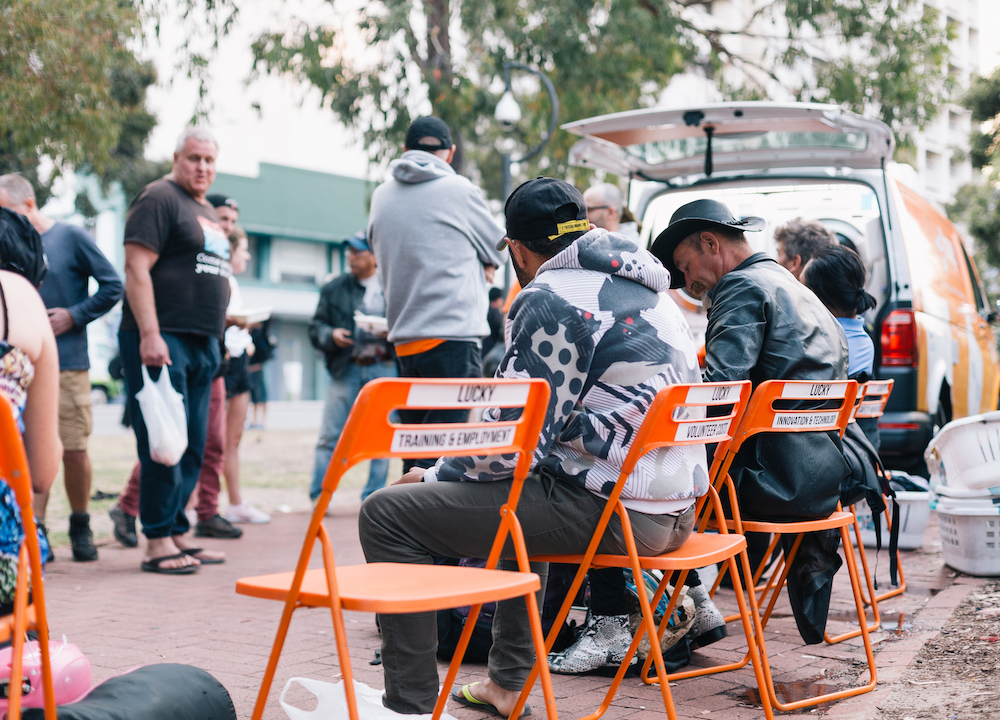
Conversation, Connection and Clean Clothes – Meet the Inspiring Duo Behind Orange Sky
Orange Sky began in September 2014 when best mates and social entrepreneurs Nic Marchesi and Lucas Patchett built a free mobile laundry in their old van to help people experiencing homelessness. What started as one laundry van in Brisbane has now expanded into a fleet of 20 laundry vans, three shower vans and six hybrid vans (a combination of washers, dryers and showers) across Australia. We caught up with Nic to learn more about the purpose and passion behind Orange Sky.
………….
What inspired you to start Orange Sky?
Lucas and I both volunteered as part of our school’s food van that supported people who had unfortunately found themselves experiencing homelessness. The school made it super easy – you signed your name up at the office and then the next week you were out in the van having a good time with your mates and friends on the street (people who use the service).
We both had an experience where we understood our privilege in that not everyone had access to the things that we did. It gave us insight into the 116,000 people who are doing it tough and sparked a curiosity and drive to help.
We had no experience in modifying vans, no experience with not-for-profits and no experience working in the homeless sector, but what we did have was an idea. We thought it was a pretty good one and so we put our efforts behind it and funded it ourselves.

Is it more about conversations and connections than clean clothes?
We often talk about Orange Sky as a magnet that draws people together from all walks of life. A magnet for conversation.
We have a simple formula; we provide a platform for everyday Australians to connect through a regular and reliable service. The focus is on creating a safe, positive and supportive environment for people who are too often ignored or who feel disconnected from the community.
One of the basic privileges a lot of us take for granted is having clean clothes to put on each day – it may seem small, but for a person doing it tough, having access to laundry and shower services can make a huge difference in their life.
Where we see our biggest impact is in the hours of conversation that take place between volunteers and friends while on shift. It’s also about supporting discussions around everyone’s role in helping people doing it tough through connection and genuine conversation.
What sort of impact has COVID-19 had on people experiencing homelessness?
COVID-19 has been an incredibly difficult time for everyone, and our thoughts go out to our friends and everyone in the community who continue to do it tough. Orange Sky was forced to pause services for short period – it was the most difficult decision we have had to make.
This time has reminded us about the importance of keeping our community safe, as well as the care and compassion of the people around us. Our main responsibility when we paused shifts was to ensure the health, safety and wellbeing of our friends, volunteers, fellow service providers and the general public.
We were so proud and inspired by our team who committed themselves to finding innovative ways to keep the most vulnerable people in our community connected during such a difficult time. Our volunteers did such an amazing job supporting our friends.
There is still a lot of uncertainty at the moment and we are committed to making sure our volunteers can do what they do best – provide a simple service and connect people doing it tough with a genuine conversation.
Every hour of every day might look different as we transition out of a COVID-19 world. We want to continue to live out our mission to positively connect communities and work as hard as we can to find new and innovative ways to support our friends both during and after this crisis.


Has Orange Sky had to alter operations in response to COVID-19?
The COVID-19 outbreak means that Orange Sky is operating in a world where things are changing daily, but what remains the same is the commitment of our team to continue innovating and supporting our friends on the street.
It’s positive to see the not-for-profit sector collaborating during these difficult times to find solutions to support the most vulnerable in the community, but we know there’s more that needs to be done.
Some examples of things we are continuing to trial during this time include:
- Increased communications: frequent check-ins with volunteers.
- Utilising tools/technology: fit for volunteering forms, text messages before and after shifts for volunteers to opt in.
- Increase mitigating risk, health and safety practice through masks, gloves and physical distancing.
Can you tell us a story that has most touched you?
I was out on shift in Brisbane at the site of our first wash – it’s a very familiar place for me, so I was doing my best to break out of the standard routine of chatting to the same friends and volunteers I see when I am there. I saw a middle-aged woman sitting on an orange chair by herself and decided to introduce myself. She told me her name was Dani. With her thick American accent and being 20 years my senior, I was wondering what common ground we could find…
We started chatting and when asked about her plans for the day, she mentioned that she had a passion for yoga and was volunteering at a studio in the city. She went there every day to help out and in exchange was given a safe space and a shower. Dani then mentioned that it was one of the volunteers on this shift that had given her the confidence to reach out to the studio. Curious, I gently asked about this volunteer. Dani said, “She’s a similar age to me, one of the kindest people I’ve met and here every Monday morning. She actually reminds me of my own mum.”
I asked if she knew her name and Dani replied, “Claire.”
It was one of those moments that I will always remember and still brings me goosebumps, because Claire is my mum.
At that moment I was reminded of the powerful simplicity of Orange Sky. Dani and I couldn’t be more different, however, we had this common connection to a single person through the magic of an Orange Sky shift. That for me sums up what Orange Sky is all about. All walks of life, descending onto orange chairs in search of connection.

What more is there to do for Orange Sky? Do you have any other innovative ideas that you would like to implement in the future?
We have been growing for a long time, but now we want to look at the vans we have and see how we can operate more shifts and expand our reach. We now have two vans in New Zealand and have commenced work on using our technology to support volunteer management across the whole charity sector.
Data is important for us to be able to grow, scale and operate. But what we also started to see was that other not-for-profits who had been around far longer than us would say, “Oh, how do you manage your volunteers and how do you operate?” We’d say, “Oh, check out this piece of software we’ve built.” And Volaby kind of just evolved from there.
Several local charities – Sunny Street, Sea Shepherd, OzHarvest and Meals on Wheels – are already using the app. It’s free for organisations with fewer than 25 employees at the moment, with the overall pricing system based on the outcomes individual organisations can achieve by using the technology. All proceeds are reinvested into Volaby’s development to increase the social impact in communities.
Volaby is about empowering amazing people to do amazing things and build this community around it, but also start to be more effective with resources.
Apart from volunteering, is there anything else you could suggest to those who want to help people living with homelessness?
I still vividly remember the first homeless friend we ever washed clothes for, and that was a guy called Jordan.
We threw the shirts in, pressed the button and then you’ve got 27 minutes of doing absolutely nothing while the clothes are washing. We sat down and had a chat with Jordan and found out some awesome stuff about him.
It turns out he went to school just up the road from me. He’d finished his engineering degree and worked as an engineer for five or six years. He was really seven or eight years down the track from where I was at that point. It really opened my eyes to the fact that it only takes one or two little things to go wrong and you can find yourself doing it tough.
I also realised that washing takes time and it presents an awesome opportunity to have a chat with someone who is generally ignored for 99% of the day, whether it’s because they’re trying to keep a low profile or because people are purposely avoiding them.
That time to have a chat, whether it’s once a week or four times a week, is a really powerful opportunity for connection that I suppose anyone can do when they come across someone doing it tough.


